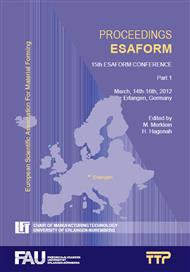p.107
p.113
p.119
p.125
p.131
p.137
p.143
p.151
p.157
Failure Evaluation of Spot Welds for Advanced High Strength Steel Sheets
Abstract:
Resistance spot welding (RSW) is commonly employed in the automotive industry to join sheet metal parts, which often involves several thousands of welds for one vehicle. Therefore, the proper evaluation of their formability/failure behavior is so vital to accurately predict overall crash performance of vehicles. In this work, the failure performance of spot welds has been experimentally and numerically analyzed for welds in which the base material is the TRIP (Transformation induced plasticity steel) 980 sheet. The mechanical properties of the base and welds have been characterized utilizing the inverse method based on the standard and miniature simple tension tests along with the lap-shear tests.
Info:
Periodical:
Pages:
131-136
Citation:
Online since:
February 2012
Authors:
Price:
Сopyright:
© 2012 Trans Tech Publications Ltd. All Rights Reserved
Share:
Citation:


